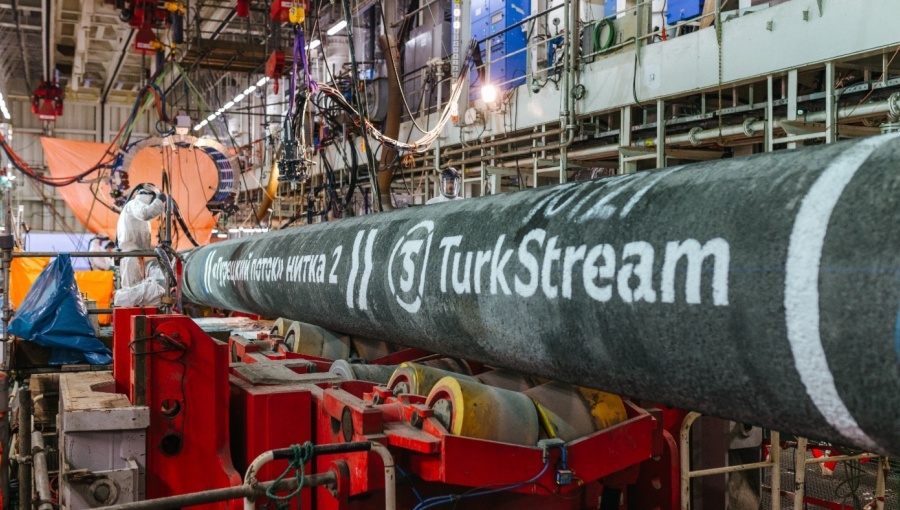Bulgaria to probe secret deals with blacklisted Russians on TurkStream construction

The Bulgarian prosecution is launching a probe into allegations that high-ranking Bulgarians held secret meetings with sanctioned Russians to agree on speeding up the construction of the local stretch of the TurkStream pipeline in violation of Bulgarian laws and procedures, the Sofia City Prosecution said in a statement on August 31.
The decision came after the Anti-Corruption Fund (ACF) NGO revealed information that on July 1, 2019, a secret meeting was held in Turkey between Bulgarian, Russian and UAE representatives to discus specific actions and a timeframe for speeding up the construction of the gas pipeline.
In Bulgaria, the then prime minister Boyko Borissov insisted that the stretch was not part of the TurkStream but an expansion of the local gas network called Balkan Stream. The construction of the pipeline was seen as move of key importance for Russian President Vladimir Putin, giving Russia an alternative route to transport its natural gas, to enable its invasion of Ukraine.
The construction of the Bulgarian stretch of TurkStream was announced by Borissov at the end of 2018. In April 2019, state-owned Bulgartransgaz, which conducted the tender to find a company to build the pipeline, picked Saudi Arabia's Arkad Engineering and Construction Company to carry out the project.
The Arkad consortium offered to build the 484 km pipeline for €1.29bn within 250 days, or for €1.10bn should the deadline be extended to 615 days.
The second-ranked consortium was connected to Russia’s Lukoil and offered to build the pipeline for €2.41bn if project was completed within 250 days and for €1.6bn if it would take 650 days. A third bidder was disqualified.
However, in May Bulgartransgaz decided to replace Arkad with the second-ranked candidate, which includes sanctioned Russian company Trubnaya Metallurgicheskaya Kompaniya (OAO TMK), a producer and supplier of steel pipes, owned by Russian billionaire Dmitry Pumpyansky and the Italian Bonatti S.p.A. That consortium lowered its price after the selection of Arkad – which is not allowed by Bulgarian law.
In June, the project was stopped by the Bulgarian Competition Protection Commission (CPC).
ACF’s investigation is based on hacked emails of the Russian politician Alexander Babakov, who has been under international sanctions since 2014 due to the Russian annexation of Crimea. The NGO published a memo emailed to Babakov following the July 1 meeting explaining in detail how to unblock the process, restoring Arkad as winner. In return, the Saudi company had to pick the Bulgarian company Completion Development S.A.R.L., a unit of TMK, as a subcontractor – also in violation of Bulgarian legislation.
On July 1, the CPC restored Arkad as the winner of the tender, ordering Bulgartransgaz to sign the contract.
In mid-September, Bulgaria’s Supreme Administrative Court ended a case launched based on objections to the selection of Arkad to build the Turkish Stream extension in the country, unblocking the process. Two days later, the construction was launched.
According to ACF, these events were discussed at the meeting in Istanbul on July 1. The NGO did not provide information on which Bulgarians attended the meeting.
The NGO also revealed that the Bulgarian-American Credit Bank (BACB) was involved in business with the sanctioned Russians. The head of its supervisory board, Tsvetelina Borislavova, sent an email to Babakov’s advisor, Alexander Vorobyov on July 19, 2019. In this email, Borislavova, who had an intimate relationship with Borissov years ago, asked Vorobyov to warn Babakov and Russian Gazpromexport that the project would be delayed due to an appeal of the procedure.
BACB responded as quoted by Dnevnik news outlet that this email was sent as it was one of the banks servicing Arkad. Attempts by bne IntelliNews to get a response from BACB remained unanswered by the time of publication of this article.
However, the ACF says that BACB was selected by the contracting parties as the investment bank for the execution of the project. It was not clear which are these contracting parties as officially the company to carry out construction of the pipeline was picked at a public tender. In that case, BACK can only be a bank servicing the Bulgarian company carrying out the tender – Bulgartransgaz, ACF noted.
The procedure to pick a bank to service the construction was officially launched a year later, in June 2020.



Follow us online